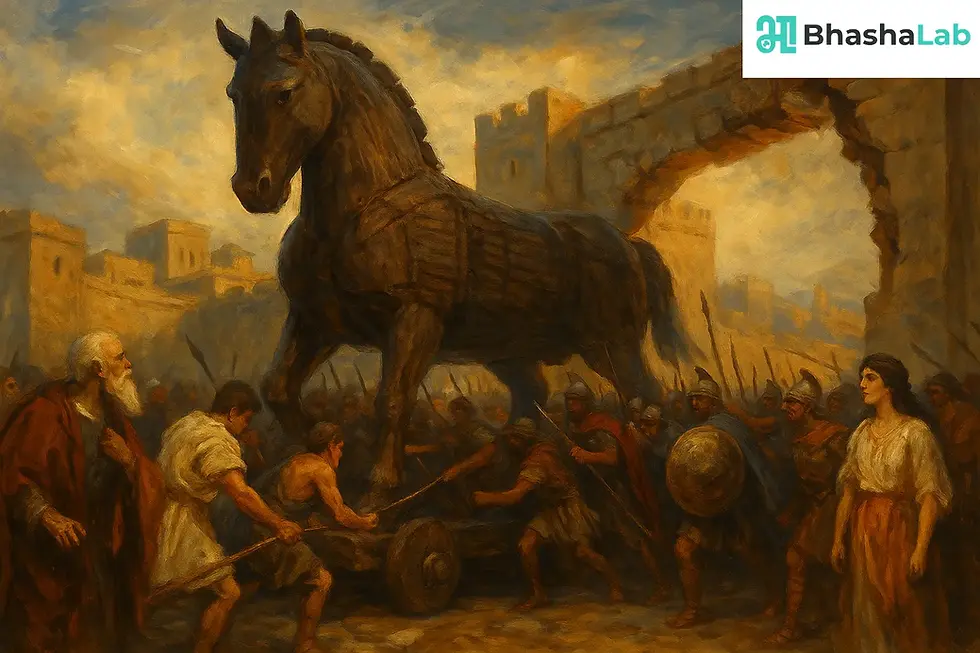2.4 The Fall of Troy - Part 2 - Std 9 - Kumarbharati
- Aug 6, 2025
- 4 min read
Updated: Aug 16, 2025

Author: Retold from Homer’s The Iliad
Genre: Mythological Narrative / Epic Retelling
Textbook: English Kumarbharati – Std X
Board: Maharashtra State Board
English Summary
This lesson describes the clever trick that led to the downfall of the mighty city of Troy. After years of siege, Greek hero Odysseus devised a cunning plan: the Greeks built a huge wooden horse to hide soldiers inside. Pretending to retreat, the Greeks sailed away, leaving behind the horse as an offering to the sea god. A Greek spy convinced the Trojans to drag it into the city. Ignoring their priest's warnings, the Trojans celebrated and went to sleep. At night, the hidden Greeks emerged from the horse, opened the gates for their army, and attacked the city. Troy was destroyed, King Priam and his sons were killed, and Hector’s family was captured. Helen, ashamed, returned to Menelaus. The once-proud city was left in ruins.
Theme / Central Idea
The lesson shows that overconfidence and ignoring wise advice can lead to downfall. It highlights themes of deception, destruction, and the tragic consequences of war.
Character Sketches
1. Odysseus
Greek warrior, clever and strategic
Planned the wooden horse trick
Played a crucial role in ending the war
Known for wisdom and cunning
2. The Greek Spy (Left Behind)
Pretended to be scared and captured
Lied about the horse to convince Trojans
Manipulated the Trojans effectively
Symbol of deceptive intelligence
3. The Trojan Priest
Wise and cautious
Warned the Trojans not to break the wall
His advice was ignored
Represents wisdom and foresight
Word Meanings
Word/Phrase | Meaning in Simple English |
Siege | Long attack/blockade of a city |
Cunning | Clever in a dishonest way |
Architect | A person who designs buildings or structures |
Persuade | Convince someone to do something |
Astonishment | Great surprise |
Tremble | Shake from fear or cold |
Sacrifice | Offering to a god, usually involving loss |
Rejoicing | Celebration, great happiness |
Leaping flames | Flames rising quickly during a fire |
Unscathed | Without injury or harm |
Grammar Questions
Infinitive / Gerund
Sentence: Let us build a horse big enough to hold men inside.
Question: Identify the infinitive.
Answer: to hold
Passive Voice / Indirect Speech
Sentence: They broke down the wall.
Question: Change into passive voice.
Answer: The wall was broken down by them.
Modal
Sentence: You will bring disaster on the city.
Question: Identify the modal verb and its use.
Answer: will – shows certainty/future prediction
Tense / Transformation
Sentence: They feasted and drank.
Question: Change into present continuous tense.
Answer: They are feasting and drinking.
Wh-question framing
Sentence: Odysseus planned the trick.
Question: Who planned the trick?
Answer: Odysseus
Personal Response Questions
Do you think the Trojans were foolish to believe the spy? Why?
Yes, they believed a stranger too quickly and ignored wise advice. Their excitement led them to make a careless decision.
Why do you think Odysseus’s plan was successful?
It used clever deception, and the Trojans let down their guard. The plan took advantage of emotion and superstition.
What would you have done if you were the Trojan priest?
I would have gathered the leaders and insisted on checking the horse thoroughly. I would try to convince them using logic and examples.
What lesson can we learn from this story?
We should not blindly trust appearances. Listening to wise counsel and thinking critically is very important.
True or False
The Trojans celebrated the arrival of the wooden horse.
→ True
Odysseus was killed in the wooden horse.
→ False
Helen returned to Troy at the end.
→ False
Probable Board Questions
What was the trick used by the Greeks to conquer Troy?
The Greeks built a huge wooden horse, hid soldiers inside it, and pretended to sail away. At night, the hidden soldiers attacked Troy from within.
What warning did the Trojan priest give?
He warned the Trojans not to break down the wall and bring in the horse, as it could be a trap that would destroy the city.
How did the spy mislead the Trojans?
He claimed the horse was an offering to the sea god and that the Greeks made it large so it couldn't be taken inside, hoping for bad luck to fall on Troy if they did.
How did Troy fall in the end?
At night, the Greeks returned, the hidden soldiers
came out of the horse, opened the gates, and the army destroyed Troy while the citizens slept.
Appreciation or Reflection Paragraph
The Fall of Troy – Part II is a powerful conclusion to the tale of war and deception. The story shows how a clever plan, combined with false trust and blind joy, can destroy even the strongest city. Odysseus's strategy stands out for its brilliance, but the tragedy of Troy evokes sympathy. The suspenseful narration and emotional end leave a lasting impact. It teaches us to listen to wise advice and never underestimate the power of trickery. This mythological lesson is still relevant today.
English Worksheet:
About BhashaLab
BhashaLab is a dynamic platform dedicated to the exploration and mastery of languages - operating both online and offline. Aligned with the National Education Policy (NEP) 2020 and the National Credit Framework (NCrF), we offer language education that emphasizes measurable learning outcomes and recognized, transferable credits.
We offer:
NEP alligned offline language courses for degree colleges - English, Sanskrit, Marathi and Hindi
NEP alligned offline language courses for schools - English, Sanskrit, Marathi and Hindi
Std VIII, IX and X - English and Sanskrit Curriculum Tuitions - All boards
International English Olympiad Tuitions - All classes
Basic and Advanced English Grammar - Offline and Online - Class 3 and above
English Communication Skills for working professionals, adults and students - Offline and Online
Contact: +91 86577 20901, +91 97021 12044
Mail: info@bhashalab.com
Website: www.bhashalab.com





Comments